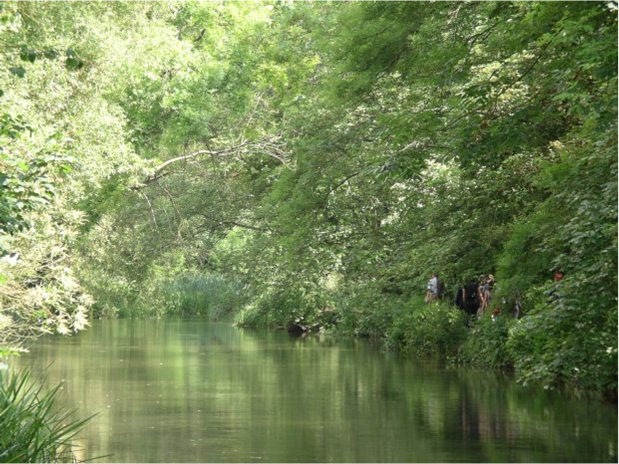
There was coverage in yesterday’s Mail on Sunday focused on an interview with Feargal Sharkey on England’s chalk streams. The article looked at the issue of dry weather within the context of chalk streams, carrying comment from Sharkey which criticised the Environment Agency’s work on abstraction licences.
There has been exceptionally dry weather over the last three winters, putting the southeast into environmental drought which has had a serious damage effect on chalk streams.
The Environment Agency is working flat out to limit the damage – our action has seen 16 billion litres of water returned to them since 2014 and has removed the risk of another 14.9 billion litres being taken. Longer term solutions include redirecting water from other parts of the country and building new reservoirs to alleviate pressure on rivers, streams and groundwater more generally.
Working in partnership is key to ensuring there are still chalk streams in a good condition for future generations. Water companies, businesses, farmers and individuals need to take action now to reduce the amount of water that they take and use. Every drop that is wasted is water that could be sustaining our rivers, streams and lakes.
An Environment Agency spokesperson said:
Exceptionally dry weather over the last three winters has caused an environmental drought in the south east, which is having a serious impact on our precious chalk streams.
We are already working on more than 60 projects to improve stretches of chalk streams, restricting the amount of water that is removed and taking action to protect wildlife where water levels become too low.
We are committed at all levels within the Environment Agency to make a difference, from our local staff dealing with catchment response through to our Chief Executive chairing the National Drought Group.
The EA’s Executive Director of Environment and Business, Harvey Bradshaw, spoke about the topic at the Chilterns Chalk Streams Conference this weekend and Pete Fox, EA Director of Water, Land and Biodiversity has previously blogged about this.
Follow the Environment Agency on Twitter, and sign up for email alerts here.
4 comments
Comment by Tim Mansfield posted on
No mention of the increasing and disturbing problem of cyanobacterial blooms during warmer weather ? I am of the opinion that the govt. agencies are not addressing this issue sufficiently. Far too much effort made by land owners, water keepers, angling bodies etc is being relied upon and not assisted enough by govt. resources. Excessive abstraction lowers water levels in the general sense which in turn elevates water temperature and nutrient concentrations at crucial times of algal development. Water treatment plants have recently been publicised as inefficient and not meeting modern requirements and standards. As water keeper for a small lake fishery in Sussex, I have experienced repeated and highly problematic situations caused by cyanobacteria in the lakes. Historically, these lakes have been fed water from a nearby stream. Currently, I do not feel I am able to utilise any of the stream water as it has a phosphate loading traceable to a Southern Water domestic water treatment plant, upstream of our service pipe connection. The Environment Agency have informed me that they have a long standing knowledge of this situation, but that they are hopeful the Govt. will apply enough pressure on Southern water to adequately improve their effluent quality by 2025. This does not help me at all, at this time. I am implementing measures to combat these inconvenient and potentially hazardous blooms by way of increasing shade around the lakes and reducing any environmental nutrient loading of the lake water as best I can. This is an exceptionally simplified account of the time, physical and financial investment that my syndicate and I have made over the past years and I have to say that I often feel we are going at it alone - I feel that the Govt should provide people such as ourselves much more effective assistance than is currently offered. I suspect that a significant part of the problem stems from insufficient funding of the relevant agencies together with a modern culture of shifting responsibilities around with the net result that little actually happens. I am 65 years old and live in hope that I may be able to utilise our stream water confidently within my days of water keeping .
Comment by Alex Heylin posted on
Over-extraction is the issue here, otherwise dry winters wouldn't make a difference. There would be plenty of water in those streams if you weren't licensing extraction of so much of it. Current extraction levels are barely sustainable after wet winters, and after dry are clearly not. Managing sustainable extraction levels is your job - do it.
Comment by William Hughes-Games posted on
If you somehow could create a glacier at the head of each chalk stream, this would go quite a way to improving the state of chalk (and other) streams. While it is a problem having less net water per year, the more serious problem is how much water there is during low water flows. You need a mechanism to transfer water from times of flood to times of drought and glaciers do this admirably. Fortunately there is another solution and it is surprisingly inexpensive. Better still it has a whole range of added benefits. https://mtkass.blogspot.com/2007/07/canadian-beaver-pest-or-benefactor.html
Comment by Joanna posted on
I’m afraid what you say is not true. There has been continual extraction by the water companies without regard to the state of the streams. The EA have not intervened when they should have done. If it is as you say, why have droughts not been declared officially?